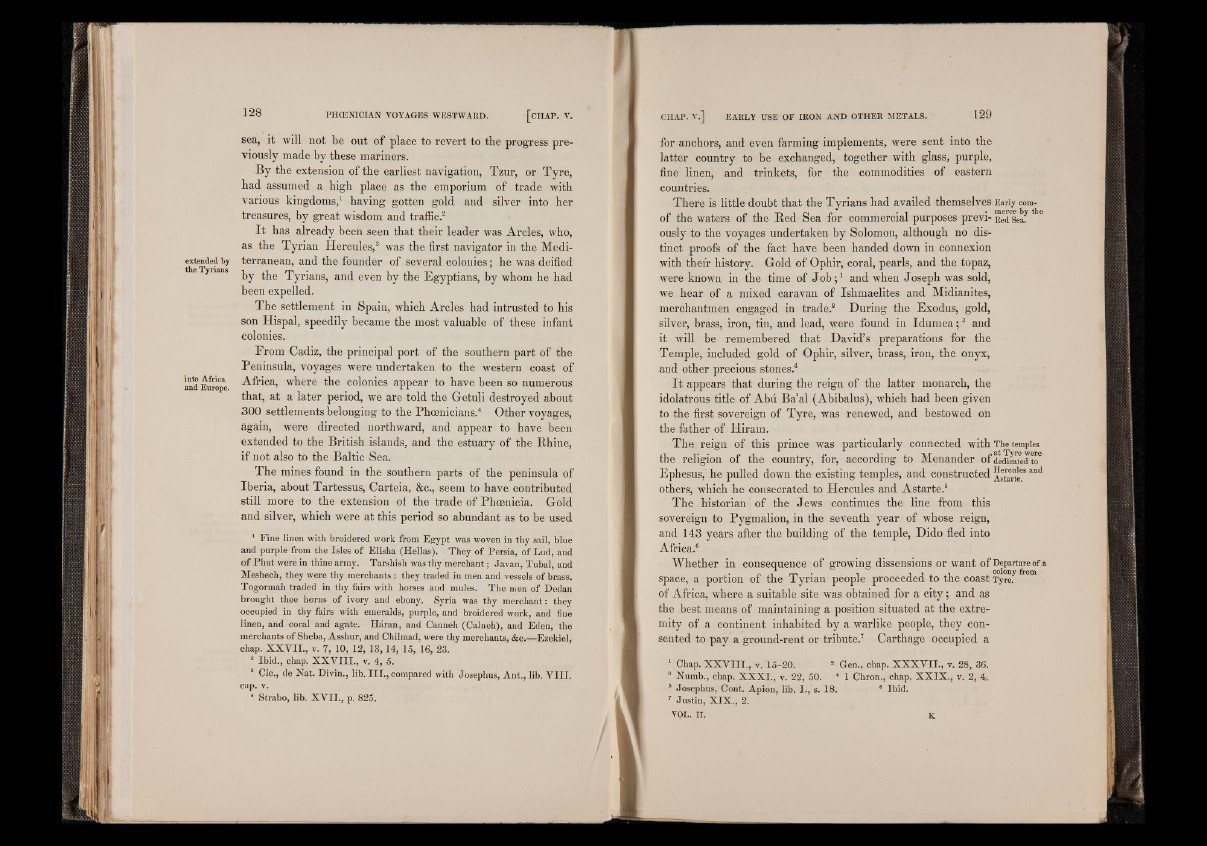
extended by
the Tyrians
into Africa
and Europe.
sea, it will not be out of place to revert to tbe progress previously
made by these mariners.
By tbe extension of the earliest navigation, Tzur, or Tyre,
had assumed a high place as the emporium of trade with
various kingdoms,1 having gotten gold and silver into her
treasures, by great wisdom and traffic.2
It has already been seen that their leader was Areles, who,
as the Tyrian Hercules,3 was the first navigator in the Mediterranean,
and the founder of several colonies; he was deified
by the Tyrians, and even by the Egyptians, by whom he had
been expelled.
The settlement in Spain, which Areles had intrusted to his
son Hispal, speedily became the most valuable of these infant
colonies.
From Cadiz, the principal port of the southern part of the
Peninsula, voyages were undertaken to the western coast of
Africa, where the colonies appear to have been so numerous
that, at a later period, we are told the Getuli destroyed about
300 settlements belonging to the Phoenicians.4 Other voyages,
again, were directed northward, and appear to have been
extended to the British islands, and the estuary of the Rhine,
if not also to the Baltic Sea.
The mines found in the southern parts of the peninsula of
Iberia, about Tartessus, Carteia, &c., seem to have contributed
still more to the extension oí the trade of Phoenicia. Gold
and silver, which were at this period so abundant as to be used
1 Fine linen with broidered work from Egypt was woven in thy sail, blue
and purple from the Isles of Elisha (Hellas). They of Persia, of Lud, and
of P h u t were in thine army. Tarshish was thy merchant; Javan, Tubal, and
Meshech, they were thy merchants : they traded in men and vessels of brass.
Togormah traded in thy fairs with horses and mules. The men of Dedan
brought thee horns of ivory and ebony. Syria was thy merchant: they
occupied in thy fairs with emeralds, purple, and broidered work, and finé
linen, and coral and agate. Háran, and Canneh (Calneh), and Eden, the
merchants of Sheba, Asshur, and Chilmad, were thy merchants, &c.—Ezekiel,
chap. X X V II., v. 7, 10, 12, 13, 14, 15, 16, 23.
3 Ibid., chap. X X V I I I ., v. 4, 5.
3 Cic., de Nat. Divin., lib. I I I . , compared with Josephus, Ant., lib. V I I I .
cap. v.
4 Strabo, lib, X V II., p. 825.
for anchors, and even farming implements, were sent into the
latter country to be exchanged, together with glass, purple,
fine linen, and trinkets, for the commodities of eastern
countries.
There is little doubt that the Tyrians had availed themselves Early com-
of the waters of the Red Sea for commercial purposes previ- ^dseafthe
ously to the voyages undertaken by Solomon, although no distinct
proofs of the fact have been handed down in connexion
with their history. Gold of Ophir, coral, pearls, and the topaz,
were known in the time of Job;1 and when Joseph was sold,
we hear of a mixed caravan of Ishmaelites and Midianites,
merchantmen engaged in trade.8 During the Exodus, gold,
silver, brass, iron, tin, and lead, were found in Idumea; 3 and
it will be remembered that David’s preparations for the
Temple, included gold of Ophir, silver, brass, iron, the onyx,
and other precious stones.4
It appears that during the reign of the latter monarch, the
idolatrous title of Abu Ba’al (Abibalus), which had been given
to the first sovereign of Tyre, was renewed, and bestowed on
the father of Hiram.
The reign of this prince was particularly connected with The temples
the religion of the country, for, according to Menander of dedicated to*
Ephesus, he pulled down the existing temples, and constructed and
others, which he consecrated to Hercules and Astarte.5
The historian of the Jews continues the line from this
sovereign to Pygmalion, in the seventh year of whose reign,
and 143 years after the building of the temple, Dido fled into
Africa.6
Whether in consequence of growing dissensions or want of Departure of a
/» •, m space, a portion of the 1 yn•a n peopil e proceedie dl; ti o the coast colony from Tyre,
of Africa, where a suitable site was obtained for a city; and as
the best means of maintaining a position situated at the extremity
of a continent inhabited by a warlike people, they consented
to pay a ground-rent or tribute.7 Carthage occupied a
1 Chap. X X V I I I ., V. 1 5 -2 0 . 3 Gen., chap. X X X V II., v. 2 8 , 36.
3 Numb., chap. X X X I., v. 2 2 , 5 0 . 4 1 Chron., chap. X X IX ., v . 2, 4 .
5 Josephus, Cont. Apion, lib, I.,'s . 18. ‘ Ibid.
7 Justin, X IX ., 2.
VQL. II. K